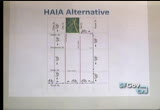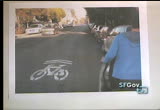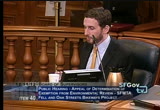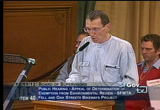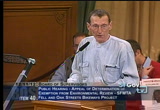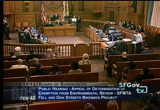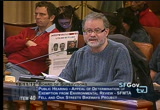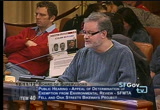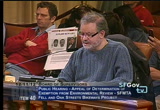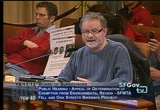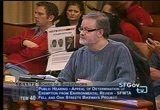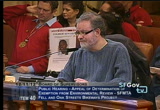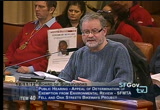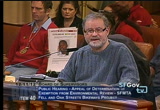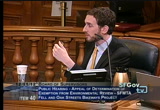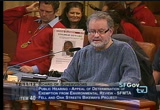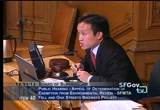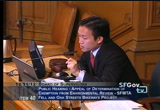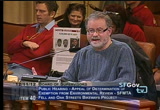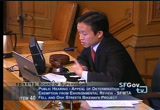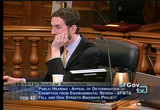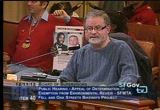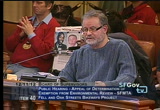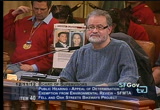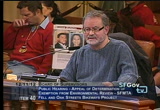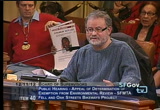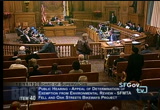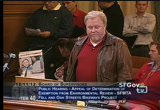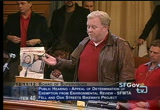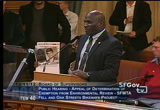tv [untitled] December 27, 2012 3:00am-3:30am PST
3:00 am
the wiggle. for those living north, coming down hayes street makes a lot of sense. likewise to avoid going up paige street, that one block hill on paige, returning from the wiggle, they can go scott to hayes, and then three blocks west, and turn left again, and into the panhandle at baker. the reason i would propose that is you can see is visually obvious. this is at rush hour, looking down hayes street a block over, actually two blocks away traffic moving in that direction inundates the street at this hour. >> president chiu: supervisor wiener has a question for you.
3:01 am
>> supervisor wiener: welcome. so one of the things i think i sometimes struggle with in these appeals and i'm sort of seeing it here, is -- and this is an appeal under ceqa, it's not an appeal on the merits of the project. and so i think there are times when appeals -- ceqa appeals come before us, and you sometimes arguments about the merits of the project get mixed in, and that may be because that's the only way for the item to come to us. and whether -- agree or disagree with it but in 1999 the voters gave the policy authority over these kinds of issues to the mta board of directors and took that authority away from the board of supervisors. so i'm hearing, both in the written submissions and also in what you're saying today, rernss references to what's good or bad engineering, what's a better route or a worse route, references to disability access,
3:02 am
to fire safety. those are all very legitimate and important policy considerations to weigh and coming up with any plan. but how should we think about this distinction between what is the right policy decision, which is not within our power, versus whether this project was categorically exempt or not from ceqa. because i think it's really important for us, regardless of what anyone's personal opinions are, to keep that distinction. >> yeah. well, let me cut to the chase with that and say that this lays the foundation for looking at the environmental -- potential environmental impacts of the proposed plan. and this alternative has a way of accomplishing the same result of moving cyclists through the panhandle to the wiggle, without
3:03 am
any of the environmental impacts that we see as jumping up in this plan. the congestion that will come from decreasing levels of service on intersections on oak street, from the unique structure of putting up plantares on oak street that will make it hazardous for cars, using their curb cuts and driveways to get in and out of their garages, et cetera. so all of the potential problems that are there, that have been categorically eliminated, just by wave of an assertion go away if you come up with a better plan that doesn't cause -- doesn't disrupt the status quo on oak street. >> supervisor wiener: but if the issue here is whether this kind of project is exempt or not, whether it falls into one of the -- or i guess two of the
3:04 am
exemptions or not. as opposed to there could be a better plan, or a kind that's not as good. so i just think it's important to focus on whether it falls into one of the exemptions. because if it does, then regardless of our view of what's a better plan, it's exempt or if it's not exempt, then it's not. but i think that's the real key. >> and my colleagues will talk about specifically to that very point. >> supervisor wiener: thank you. >> about the categorical exemptions. >> president chiu: thank you. why don't we continue and continue the clock as well. >> howard shaf ner president speaking to the nuts and bolts that supervisor wiener asked about, first of all, in our briefing i think we've dealt with that quite a bit, and also briefing from our council. but first of all, you can't have
3:05 am
categorical exemption when there's cumulative impact with another project and that would be the case with the masonic -- project. the planning department itself sis in their brief the cumulative impact is the streets and their vicinity affected by the project. masonic is the major north-south thoroughfare and fell and oak are the major east-west thoroughfares. masonic has 32,000 motor vehicles a day it's a few blocks from baker street. in fact, they were going to remove a bus stop on central, which is only one block from masonic. the masonic project would remove all street parking on both sides of masonic for over half a mile including through fell street around 171 parking spaces reduce travel lanes on masonic during morning and evening rush hour
3:06 am
just as the fell and oak would remove -- on rush hour and reduce lanes on baker which -- between fell and oak. many motorists basically, and pedestrians, turn north on masonic from fell and oak. many who are proceeding southbound on masonic turn left on oak. so the masonic project will have environmental impact on the same neighborhood which will be compounded by this particular project. because of that there's no categorical exemption. >> supervisor wiener: do you think that if the masonic project didn't exist, would this project be categorically exempt? >> the answer is no, it would not. it would still not be categorically exempt because the two exemptions they rely on really don't apply. one is existing facilities, which is minor alteration of existing facilities involving negative liberal or no -- use. and one of the examples is cited
3:07 am
of an existing facility can be a bicycle trail. well there is no bike lane existing on oak so the exemption doesn't even arguably apply to oak. there are no buffer strips on either street nor are there raised plantares. so it wouldn't apply to that piece of it. and i guess getting out to the idea of raised plantares this is also a unique circumstance which is one of the other item -- one of the other categories that takes you out of the exemption because -- this is the first time in any project in san francisco where you can actually have these raised concrete plantares in the middle of the street in effect which will be safety hazard and so forth, plus all of the parking lots, when you combine the two, would impact each other. but getting back to the -- >> supervisor wiener: do you think any time you add a bike lane does that require an eir? >> any time. >> supervisor wiener: if you add a bike lane to a road that didn't have it before. >> i think there's a pretty good
3:08 am
argument that's the case but we don't have to get to that here because you've got the plantares, you've got the fact that -- well what i would say is this particular exemption would not apply if you're putting a bike lane where none exists before because it's a -- it's for existing facilities. the other one is minor alterations and again this is not a minor alteration. you're putting raised concrete plan tars along fell and oak for three blocks of a densely populated congested area and turning it the other direction, if the removal of parking lanes or travel lanes and replace it with bicycle lanes were automatically categorically exempt which seems to be what the planning department is saying then you could remove every single travel lane in the city or every single parking lane in the city and say it is categorically exempt and that would be ridiculous essentially the city tried a similar
3:09 am
argument several years ago with the overall bike plan saying it was categorically exempt and the court said no and the city lost time, and money, and was, you know, judicially criticized for doing that. may i have another minute or so? so -- >> [timer sounding.] >> so basically the two -- >> supervisor wiener: i'll let you continue since i took up some of your time, if you could continue. >> thank you. so the other thing is that there are unusual circumstances. so basically both of the exemptions claim do not apply. the minor alterations and existing facilities. but even if they might have otherwise applied there's two reasons why you can't use categorical exemption. one i just dealt with in terms of the cumulative impact of masonic plus this project. the other one is simply unusual
3:10 am
circumstances. and if there's a reasonable possibility that the project will have significant effect on the environment due to unusual circumstances, you can't use a categorical exemption. a lot of our submissions, and those of -- in support of us which are part of the record talk about the congestion that would be increased, the circling of parking, the density of the neighborhood, the fact that there are wood framed structures in the neighborhood, fire safety would be impeded. i mean they remove the bulb-out at filleti's market because the struks can't get by. if a delivery truck can't get by what about fire trucks. when you look at the entire neighborhood as a whole and combined with the fact that you have these raised concrete plantares which are totally new and unique and they are a part of the permanent physical structure, and the fact that you have about 29 or 31 driveways on
3:11 am
the scott -- i mean on oak, that would be impacted, just again getting to the density of people having to back in and out, past this bike lane, and when you consider that not many bicycles don't use lights, day or night, many of them blow through red lights, they -- you know, they just drive recklessly, a lot of them. so when you add that situation to the existing density, the complexity of the neighborhood, the fact that it's a lot of pedestrians, tourists, a lot of businesses, there's a hotel on divisadero, the big sp, former sp hospital building, which is a senior center, there's an orthotic and pros at the timic center servicing disabled people on divisadero, when you combine that, any change to a neighborhood like this, that is might even seem small, would
3:12 am
have a major impact and i think there are -- so there are unusual circumstances in this particular neighborhood that would preclude using a categorical exemption. >> supervisor wiener: let's talk about bulbouts, let's say there is no bike changes but we were to say for 10 blocks in a row we were going to bulb-out all 10 intersections could that trigger an eir? >> i don't think we have to get to that here because, again, this whole project has 15 different elements. i can read them all but i think everybody is familiar with that. i don't think we have to look at each one piecemeal and say would that element, in and of itself, require an eir. we're not -- to get to that. the point is we have this complex cocktail, this complex mixture of things that are all part of this project, and all together combined require an
3:13 am
eir. >> supervisor wiener: and i ask because, when we're -- even though each ceqa appeal is unique in some ways, we do set a precedent in a way because, in the planning department, next time they evaluate something, will look to what we did in a particular case. and so when you talk about things like a bulb-out or adding a bike lane, even though i understand your argument, you're saying cumulatively in this situation it trichs into an eir in terms of determining whether a categorical exemption applies i think it sets a certain precedent because we do, you know, try to improve pedestrian safety in the city and try to approach streetscapes in different ways. and if everything is going to trip into an eir, which is enormously expensive and time consuming, it really changes the way we make policy in terms of our streets in the city. that's why i'm really pushing on that. >> well i don't think we -- i mean this is the result of this
3:14 am
particular appeal is not going to be a binding legal precedent. so i don't think you really have to get to that issue. but if you were -- if you're saying if they did 12 bulb-outs in a row would they need to do an eir, probably not. but i think it's a huge safety impact if you do that many in a row. let me also just add that the tpt which is the predecessor of this department doesn't have a good track record in our neighborhood when it comes to things like that. a number of years ago the paim h paige street traffic circles was a temporary project for one month. these would have impeded fire safety. we have documents from the fire department stating that but they did it really without any analysis. so getting back to your bulb-out question, no, i think probably if you had a project that involved nothing with bulbouts -- but that's not this
3:15 am
project. >> supervisor wiener: thank you. >> president chiu: i have one follow-up question what supervisor wiener asked. i heard you answer a question earlier about how it's your perspective that there is environmental review that's required here. and i certainly appreciate that there are differences of opinion in the community about whether this is good policy, whether this is the right thing to do. but i think the question in front of us is again whether this ought to be categorically exempt. and what i'm having trouble understanding is that plain language of one of the exemptions for environmental review is the creation of bicycle lanes and existing rights of way. i can't imagine being clearer than that. what i don't understand is just, again, how are you proposing we get around what is clearly stated statutory if that is the question. >> the preamble says minor alteration. in both exemptions, they have to be a minor alteration, and bike
3:16 am
lane is listed as one of the examples of a type of minor alteration. but just because it's a bike lane doesn't therefore mean it's a minor alteration. it's a two-pronged -- basically the criteria it's got to be a minor alteration and then bike lane is listed as one of the possible types of minor alteration. but that doesn't mean every bike lane is a minor alteration. that was the -- as i understand it, that was the argument that the city made on the big bike plan and they got slapped down by the dort when they made -- court when they made that argument. >> president chiu: if i could respond to that the code refers to what is described as quote minor alterations for example new -- landscape, filling of earth and then it lists a number of minor alterations of land. again, colleagues, in case you hadn't had a chance to read other exemptions, it refers to the new gardening, filling of earth, minor alteration in land
3:17 am
water -- officially designated wildlife management areas, minor -- having no permanent effects on the environment, minor trenching or backfilling and then goes to other descriptions that aren't qualified with the word minor. so if your suggestion is that we have to read the word minor into a minor creation of bicycle lanes, it just doesn't seem to be backed up in the statute. >> i'm not following what you're saying. i think the preamble to that is minor. those other examples you cited mostly have to do with landscape and gardening are examples of things that would be typically -- or that could be considered minor but that doesn't mean that every single thing on that list is always considered minor. again, i get back to the -- this is one of the exemptions that was relied on when this city decided not to do an eir on the big bike plan. and the court said no, you --
3:18 am
it's a question of fact as to whether something is minor or not minor, depending on how extensive it is. in this case we have the raised concrete plantares which had never been done before, which are going to be in the middle of the pavement on two of the busiest streets in the city, you're going to have trucks going down there, you're going to have's cars circling, bicycles in close proximity with fast-moving motor vehicles. to say that's minor i don't see that. >> president chiu: again, i think i appreciate we have a difference of opinion on this. the only last thing i would say seems to me that you're reading a requirement into the code that simply isn't there. there are certain types of alterations that are qualified with the word minor but others in that list there's nothing that refers to the minor creation of bicycle lanes. >> no. i don't have it behind me, it's hard to reach. i don't have it in my notes right here. the preamble that says minor
3:19 am
refers to everything in that -- in the list that follows it. >> president chiu: if i could just be clear and again we don't have to engage on this, this says this class consists of minor or public alterations examples include but not limited to and there's a list and some of the items are included with the word minor, as i said but others are simply if you are engaged in gardening or landscaping that is exempt. if you're engaged in trenching that is exempt. if you're involved in bicycle lanes and existing rights of way that is also exempt. >> are you suggesting the court was wrong when they said the city had to do an eir? >> president chiu: i'm saying i think you're reading words into statutes that don't exist but again i appreciate we have a difference of opinion on that. supervisor campos. >> supervisor campos: thank you, mr. president. thank you for the presentation. i'm wondering, along the lines of what president chiu was asking, i mean what's your definition of minor? i mean -- >> again, i don't think we need to get to what would be minor.
3:20 am
in this case, it's clearly not minor when you have a creation of a bike lane on oak where none exists at all, when you have, on fell street, you're moving a bike lane about seven feet over. on both streets, you're putting in these fixed concrete plantares. you're also narrowing the -- you're reducing the road capacity on oak street in the middle of the morning rush hour by 25%, by taking out one lane. you're also reducing the road capacity of baker street. you are also removing 100 or so street parking spaces on oak and fell, including some white zones and some yellow zones. so we haven't talked about the parking -- but when you add that
3:21 am
all up together, it's definitely not minor. and i don't think that -- in order to make your decision, i don't think you need to decide what is the small -- what is the biggest minor thing that is exempt because this is way, way, way above that biggest minor thing that would be exempt. >> supervisor campos: well you had a traffic study that was done here. >> first of all it wasn't an independent traffic study. it didn't -- it was discussed in about two pages of their declaration, saying it's categorically exempt. we've been asking for them to do independent studies on what -- and also the traffic study talks about level of service deck rements or increments but it doesn't say there's no study done whatsoever about the effect of the loss of that much
3:22 am
parking. it's based on the opinion, or the experience of san francisco traffic planners. but the fact -- essentially, their argument is that when you remove parking, people either shift their mode of transportation, or they just decide to stay away altogether. well there's some statistics, i don't have them -- i don't have the exact numbers but i looked recently, the mta has these annual reports, and from about 2008 to 2011, the number of street parking spaces decreased by 12 or 13%, and the number of automobiles registered in san francisco decreased by about 1%. so that's a piece of evidence that would seem to indicate that the idea that, when you remove parking from a very dense
3:23 am
neighborhood, that there's no impact, is just against the common sense of almost everybody who lives in that neighborhood, and who's ever had to find parking. >> supervisor campos: aren't they adding parking as well in some streets? >> well the net -- the removing of 100 parking spaces on oak and fell, they are putting back a certain number -- so that includes both the bulbouts and the parking removal for the bike lanes. they're putting back a certain number, about 13 i think it is, by removing some of the bus stops on the 21 hayes. and in fact one of those bus stops that they were going to remove was actually outside what they considered the project area. but the other thing is that they're going to be doing is converting what is now parallel parking on three blocks of baker and one block of scott into either a -- in some cases perpendicular and in some cases
3:24 am
back-in angled parking. but they to get credit for the number of parking spaces added back by including all of those, whereas in fact some of those blocks are actually outside of what they consider to be the project area. so you've got about a net -- the way i calculate it, you've got a net of about 11 or 12% of parking loss. and when you -- and particularly they haven't done any studies of any kind, as far as i'm aware of, at night. and this is where the parking is really the most scarce. so the idea that -- we sunshined -- we sunshined requested what is their -- what documents support their conclusion, or even what documents relate to their conclusion, about -- that if you remove parking, there's essentially no environmental impact. and the answer both from the mta and from the planning department was we have no documents.
3:25 am
that was shocking. and not only that, in the answer, it said -- the answer from the planning department said something like, we have no documents, we just inserted our standard boilerplate language that when you remove parking there's no environmental impact. well there's no empirical data to support this, there's nothing whatsoever to support that. >> president chiu: thank you. >> supervisor campos: i think as if my friend charlie would say i get your point. so thank you. >> president chiu: thank you. >> any other questions? >> president chiu: any other questions, colleagues? at this time, why don't we go to members of the public that wish to speak on behalf of the appellants. if you could please line up on the right-hand side of the chamber. and please step up to the microphone. first speaker please. walter, that's you. >> hello. it's working. ♪ city, city, give me your
3:26 am
environmental review ♪ ♪ i'm half crazy all for bike riding with you ♪ ♪ and we won't -- we will ride through oak street, but you'll look sweet, upon the city bike seat, of a bicycle -- and you're riding there with president chiu ♪ >> president chiu: thank you. next speaker. >> hello. j.j. dillon, i came to san francisco in 1994 when i got out of the service, i went to usf, i worked hard in the city, i finally bought a place in the city last year. i'm not going to argue the merits of the bike policy. i went to one meeting but most of the meetings are held during the day when i actually work, thank you very much. but let's get down to the issue of whether this really needs
3:27 am
environmental review. we can argue about what's minor. we can argue about what might be major. but i'd like you to do something tonight. i would like you to realize that there's a giant project going on three blocks from your house, and that that project is three blocks away from another giant project. that's going to take away a combined almost 230 parking spots. they're going to move into the neighborhood or move into other neighborhoods. how is the city not looking at this as a whole plan, not just taking little individual neighborhoods and railroading them through. a better plan would be to look at the entire bicycle lane issues. i don't think it's major. i think it would be minor when you ask what is the difference between minor and major. minor is a bike lane on mccallister. minor is a bike lane on paige. major is a bike lane running through masonic going through fell. have you seen the amount of cars there? do you see the amount of cars
3:28 am
backing in to get on to the bay bridge? do you see the amount of airport shuttles, amount of taxis that are using that route? as i said i'm not here to argue the merits of the route but the city owes it so itself to be a complete impact of the entire plan and all plans in the area. thank you. >> president chiu: next speaker. >> good evening, board members. this is off the bike path real quick because i've been here all day as well and i want to make this comment before it gets too late. i don't know if you all know in your districts, my office down at transport workers union is in receipt of a letter from the agency, the sf mt agency that they're going to cut office over the holiday weekend, not knowing -- i'm pretty sure you don't know about this. >> president chiu: is this comment relevant to this appeal? >> yes. >> president chiu: okay. thank you. next speaker. and if i could ask folks again,
3:29 am
your comments during this comment period, is on this appeal. >> hello. i'm dan coolly, and i am concerned that there is no environmental impact report associated with this major change to the city's traffic flow, major change to pedestrians, major change to folks that will be in wheelchairs, attempting to access, major change to neighbors that are trying to park their vehicles in that very highly impacted and highly crowded neighborhood. it's shocking to me that the city would -- with a straight face, think that this was not some kind of a significant impact that would at least warrant environmental review. i'm not saying ulti
80 Views
IN COLLECTIONS
SFGTV: San Francisco Government Television Television Archive
Television Archive  Television Archive News Search Service
Television Archive News Search Service 
Uploaded by TV Archive on

 Live Music Archive
Live Music Archive Librivox Free Audio
Librivox Free Audio Metropolitan Museum
Metropolitan Museum Cleveland Museum of Art
Cleveland Museum of Art Internet Arcade
Internet Arcade Console Living Room
Console Living Room Books to Borrow
Books to Borrow Open Library
Open Library TV News
TV News Understanding 9/11
Understanding 9/11